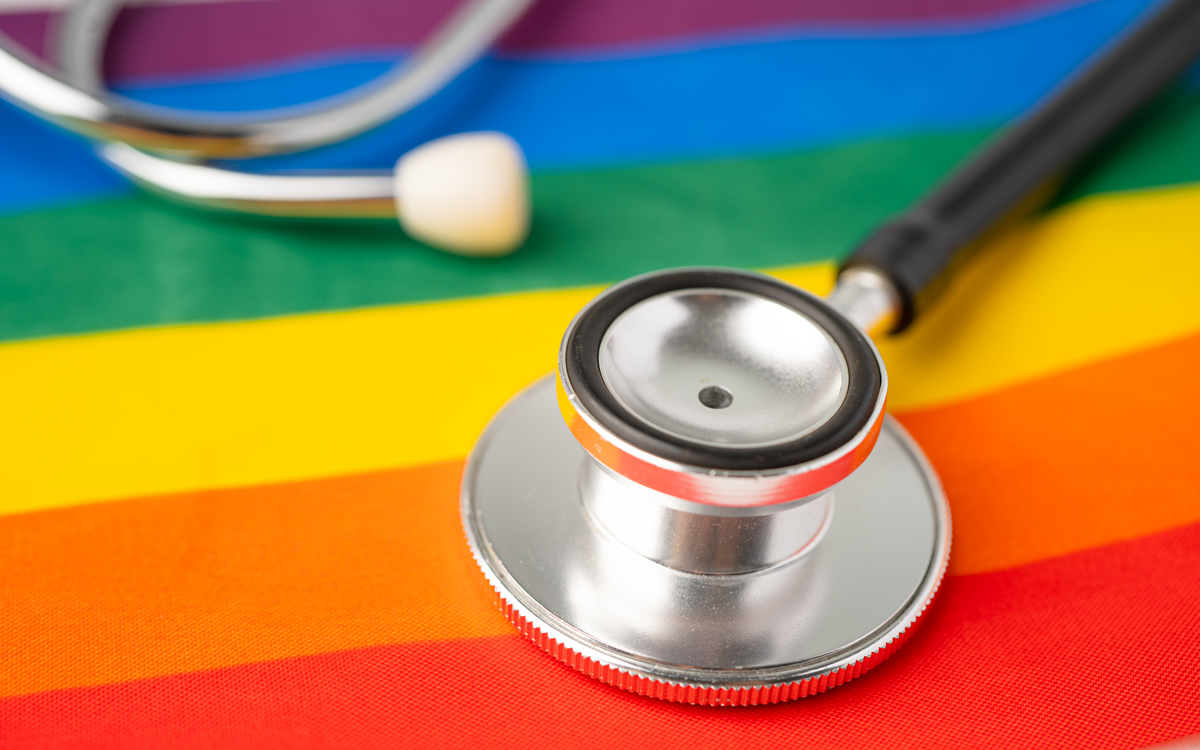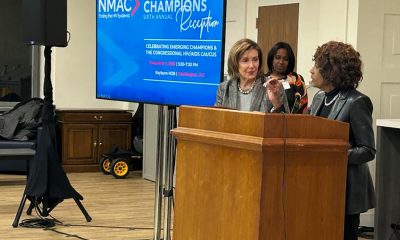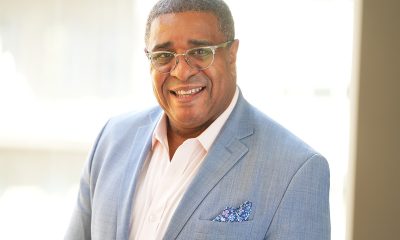Opinions
The LGBTQ+ community, telehealth, and rural broadband access
Congress must act to preserve lifeline of remote healthcare

The LGBTQ+ community has come to rely more and more on remote general and specialized healthcare as the pandemic continues to limit access to in-person services. This lifeline is in danger of going away unless Congress acts, delivering a serious blow to the diverse community of people who struggle to access care in-person in their communities.
Telehealth allows doctors and other providers to provide care without an in-person visit. More specifically, telehealth refers to the health care services accessible through telecommunications services, including via audio and video (either real time or asynchronous). These services are best delivered via high-speed broadband services. Medical care appointments, consultations, prescriptions, follow-up visits, and more can be done safely and virtually.
Telehealth is a modern necessity made even more relevant due to the ongoing COVID-19 pandemic, and demand for these resources is growing. The LGBTQ+ community in particular is experiencing a significant need for improved telehealth provisions and access. Recent relaxations of telehealth regulations have expanded the reach of telehealth and positively impacted marginalized communities including the LGBTQ+ community, especially in rural and remote areas. Effective and reliable broadband access is instrumental for telehealth services and as telehealth expands, advancements to universal broadband access will be critical to reach these communities.
Telehealth and the LGBTQ+ community
More than 18 million Americans identify as lesbian, gay, bisexual, transgender, queer, questioning, or intersex (LGBTQ+), and more younger Americans than ever before are identifying as LGBTQ+. The health concerns of these individuals deserve utmost respect and care, demonstrable through high-quality health care both in person and online. Telehealth plays an important role in connecting the LGBTQ+ community with competent and affirming health care providers and services. The LGBTQ+ community has always been more heavily reliant on internet connectivity, and healthcare is no different, with 81% of LGBTQ+ youth reportedly using the internet to search for health information.
LGBTQ+ communities face many of the same healthcare concerts as non-LGBTQ+ communities, though there are differences in rates of some chronic conditions including cancer, diabetes, obesity, HIV/AIDS and other sexually transmitted infections (STIs), and tobacco-related health conditions. LGBTQ+ individuals have higher rates of mental and physical disability, and the impact of loneliness on health quality is experienced at higher rates by LGBTQ+ individuals in both urban and rural settings. Routine healthcare for these conditions improves quality of life, but LGBTQ+ individuals often report high cost as a deterrent from going to the doctor. Telehealth provides an affordable avenue to routine health care.
Many individuals in the LGBTQ+ community report a history of medical trauma as a barrier to receiving healthcare. Gender-affirming health care is one major motivator for telehealth access in the LGBTQ+ community. Nearly one-fifth of transgender individuals have been refused healthcare due to their gender identity. Online servers such as Folx Health, Plume, and QueerDoc provide gender-affirming care including hormone therapy, mental health, and documents for gender marker change. Telehealth allows users to bypass the barrier of proximity to medical care and to access providers who are informed on medical concerns and considerations that uniquely impact the LGBTQ+ community.
Regulations that previously restricted the delivery of telehealth have been eased since the onset of the COVID-19 pandemic. Specifically, rules previously limited telehealth to rural areas received in a clinical setting. The new rules allow urban and suburban patients to access telehealth from their home or other convenient setting. This makes sense as many urban areas lack convenient access to physicians and other providers. Individuals across America have benefitted from the ability to access basic health services at home, but those whose care has been most significantly enhanced are poor, elderly, members of marginalized communities such as the LGBTQ+ community, and/or those who live in remote areas of the country. For example, the total number of telehealth visits in Medicare increased from less than 1 million to more than 50 million during COVID.
There are currently hundreds of proposals pending before state and federal legislatures that address extending or expanding telehealth beyond the pandemic’s public health emergency. Current changes to telehealth regulations include loosened restrictions around telephone-based check-ins and the allowance for telehealth visits between providers and persons across state borders. Before the pandemic, patients filled a prescription after first meeting with a doctor in-person, but telehealth expansion has eliminated the required in-person appointment. Telehealth treatment for addiction is also on the rise, with addiction-specific treatments available online. General mental health resources are also increasingly accessible virtually and by phone. Now that these practices are commonplace, regulators are looking to pass legislation that will maintain this ease of service.
The expansion of telehealth has proven especially effective for the LGBTQ+ community. Easing accessibility of telehealth and prescriptions reduces the cost of care for routine medicines and check-ups for conditions that disproportionately affect the LGBTQ+ community, such as HIV. Increased availability of telehealth mental resources is critical for all youth, but especially for those in the marginalized LGBTQ+ community. Through online resources, transgender adults can safely and reliably access gender-affirming healthcare including hormone replacement therapy and counseling with specialized professionals. Additionally, telehealth access can reduce or eliminate the stigma and discrimination that LGBTQ+ individuals face daily when selecting providers, especially in remote or rural areas where there may be few providers to choose from and even fewer knowledgeable about and sympathetic to the special health care needs of LGBTQ+ individuals. Making permanent the COVID-19 exemptions currently in place that regulate telehealth services will have far-reaching, positive impacts for the LGBTQ+ community.
Rural need for telehealth
An estimated 2.9 to 3.8 million Americans living in rural and remote parts of the country identify as LGBTQ+ and deserve high-quality and informed healthcare. Accessing a healthcare provider is, in general, more challenging in rural areas. Consider, for example, costs associated with distance. To add insult to injury, where providers are available in rural communities, the potential for discrimination against LGBTQ+ individuals and misdiagnosis of medical conditions is prevalent. Lack of access to sympathetic providers or specialized providers makes telehealth a crucial tool for the rural LGBTQ+ community.
Given the need for broadband access to ensure quality telehealth services (to access video consultations, for example), the quality of an individual’s access to broadband services will directly affect their health care experience. Rural Americans are routinely left behind in broadband deployment, contributing to the digital divide, or the gap in use of online resources. Improvements to broadband access is key for expanding the reach of telehealth services across the country, especially in rural America. The recently enacted infrastructure law includes $65 billion in new broadband funding. It must be rolled out quickly to ensure marginalized communities in rural areas gain from improvements to broadband access and the telehealth resources that come along with it.
Telehealth has become a critical tool to expand access for all patients, but especially the LGBTQ+ community. Marginalized individuals benefit the most from increased telehealth access and those living in rural areas may be the most significantly impacted. Telehealth offers a number of benefits including facilitating community health and social wellness, the delivery of gender-affirming medical care, accessible mental health care, and ease of prescription access.
Recently relaxed regulations around telehealth delivery have increased the reach of these services and provided healthcare to individuals who may have gone without care. Rural and remote marginalized communities, such as the LGBTQ+ community, will experience an especially positive impact from telehealth, and increasing rural broadband access is critical to expanding high-quality, informed healthcare to LGBTQ+ individuals across America. Crucially, Congress can permanently expand telehealth services and capitalize on the recent infrastructure law to roll out high-speed broadband that facilitates telehealth in areas with limited internet access. Without congressional action, many of the benefits marginalized communities have experienced from telehealth services will expire thereby reducing or eliminating supportive and specialized care options for these communities.
For more information visit www.LGBTQ+tech.org/telehealth.
Carlos Gutierrez is deputy director and general counsel for the LGBT Technology Partnership & Institute, which works to improve access, increase inclusion, ensure safety and empower entrepreneurship for LGBTQ+ communities around technology.
Opinions
The global cost of Trump’s foreign aid ideology
Expanded global gag rule polices people’s identity

U.S. Vice President JD Vance on Jan. 23 announced the new Promoting Human Flourishing in Foreign Assistance Policy. This policy, which has nothing to do with flourishing, is part of the Trump administration’s effort to weaponize U.S. foreign assistance to enforce ideological conformity, to police people’s identity, and to suppress dissent — both at home and abroad.
One of the policy’s three pillars advances a discriminatory framework that denies transgender people’s existence and seeks to censor organizations that affirm transgender people and their rights.
The new policy expands the Mexico City Policy, also known as the global gag rule, which has restricted U.S. foreign aid to non-U.S. civil society organizations providing abortion care under every Republican administration since 1984. What is new — and unprecedented — is the expansion of this rights-restricting logic to efforts addressing gender identity and, more broadly, nondiscrimination efforts.
The new policy also applies to more categories of aid recipients, including multilateral organizations such as UN agencies.
With the expanded global gag rule, the Trump administration seeks to make transgender people invisible globally, as it has within the U.S. Whether it is threatening steep tariffs for countries that resist Trump’s appetite for Greenland, or withholding funds for organizations that refuse to toe the ideological line, the chilling message is clear: standing in the way of the administration’s political or ideological goals will come at a high cost.
Under this rule, organizations risk losing U.S. funding if their activities are seen to fall under the spurious concept of “gender ideology.” Organizations are not allowed to provide, refer for, or support access to gender-affirming care. Neither can they offer accurate information, counseling, or public-facing support for transgender people. The restrictions even apply to cultural activities such as “drag queen workshops, performances, or documentaries.”
Organizations that receive any foreign aid from the U.S. will need to censor themselves, even if their own national or regional laws enable — or oblige — them to speak up for human rights.
This new policy comes after the Trump administration dismantled the U.S. Agency for International Development, which has for decades provided the bulk of U.S. international development and humanitarian assistance.
To be clear, LGBT people, regardless of where they are, do not depend on the United States to organize, advocate, and stand up for their rights. And foreign aid is not the answer to undoing global inequity. But the sharp reversal of U.S. foreign policy will have wide-ranging consequences.
For years, protecting the rights of LGBT people had been a core tenet of the U.S. commitment to human rights. U.S. embassies often functioned as safe havens for human rights defenders in places where governments stoked homo- and transphobia for political gain. For LGBT people in the 65 countries that still criminalize same-sex intimacy, civil society-run clinics, supported with U.S. funds, became life-saving spaces — people could get HIV and other care there without fear of being turned away, ridiculed, or reported to the police.
Much of this is progress is now at risk. As a result of the U.S. funding cuts, organizations that directly provided health care and other services for LGBT people were forced to stop services abruptly, cutting off people’s access to chronic medication often without alternative care in place.
The impact extends beyond individual harm. Public health programs by definition are more likely to fail when stigma and fear are institutionalized. Transgender people are among the groups most at risk for ill health precisely because of discrimination and violence.
By prohibiting organizations, from local civil society groups to multilateral organizations like UNAIDS, from affirming transgender identities or addressing these underlying conditions, the expanded global gag rule actively undermines the foundations of effective public health programs.
Under the new and expanded gag rule, organizations face a terrible choice for accepting any U.S. funding. They can either self-censor and stop all work related to transgender people’s rights and needs. Or they forego U.S. funds and risk jeopardizing their organizational survival in an increasingly tough economic and funding climate.
This matters because civil society is one of the few effective counterweights to the global rise of populist and authoritarian governance. Alongside a coordinated global backlash against women’s and LGBT people’s rights are efforts to concentrate power, erode accountability, and close civic space.
Civil society organizations are crucial in exposing and resisting the authoritarian creep and in supporting marginalized groups. Gagging organizations into silence, or hollowing them out through funding cuts, accelerates civic space closure, and strengthens authoritarian governance.
Where the U.S. retreats and bullies, other countries and communities need to step up to offset the funding shortfalls and reduce organizations’ dependency on ideologically restricted U.S. foreign aid.
They need to support marginalized groups, increase funding for civil society groups, and commit funds to bolster multilateral mechanisms such as the Global Fund, which supports funding to combat HIV/AIDS, TB, and Malaria. They should clearly and consistently affirm everyone’s human rights, without exception.
Alex Muller is the director of Human Rights Watch’s LGBT Rights Program.
..

Renee Good. Alex Pretti.
During this last year, I wondered who would be the first U.S. citizen to be shot by our government. It was not a matter of if, but when. Always.
And now we know.
I thought it would be soldiers. But the masked men got there first. Because when you mix guns and protests, guns inevitably go off. The powers that be always knew it, hoped for it, and wanted it to happen.
Why? Because masked men and guns instill fear. And that’s the point. Ask yourself when’s the last time you saw masked men and guns in our cities, or anywhere for that matter. I always thought that men masked men with guns robbed banks. I was wrong.
Masked men want to rob us of our dignity as human beings. Of our assurance in the calmness and contentment of our communities. They want to rob us of our trust in our institutions, and our faith in each other. And truly they want to rob us of the happiness and joy that we all constantly yearn to find in our lives.
But our only collective ability as a nation to push back is our protests. Peaceful protests. As Renee and Alex did.
But peaceful protests? Because they are the perfect power to shame the cowardice of those that believe guns and force are the only true authority. Fortunately, our last hope and fiercest ally is our Constitution, which gives us the power — and the right — to protest.
How much more peaceful can you get when you hear Renee Good’s last words, “I’m not mad at you, Dude.” I may be mad at the system, the government, the powers of unknown people pulling the strings but not you personally. “Dude.” Peaceful to the last word.
Yet, what becomes lost in the frantic pace of hair-trigger news cycles, of officials declaring impetuous damnations alongside johnny-on-the spot podcasters spouting their split-second opinions are the two human beings who have lost their lives.
How habituated we’ve become as we instantly devour their instant obituaries. The sum of their lives declared in less than 10 seconds of cellphone video. They haven’t just lost their lives. They’ve lost all of their lives. And now we watch over and over again as their death is re-revealed, re-churned, re-evaluated, and re-consumed. In that endless repetition, we forget the meaning of life itself.
We must remember that Renee and Alex believed in their communities, in the purpose of their work, in the happiness of their loves and lives, and in the dignity and curiosity of life itself. They were singular individuals who did not deserve to die at the end of a gun barrel for any reason, ever.
How fitting that Renee was a poet. Sometimes in confronting the massiveness of loss in our lives, we look to our poetry and our psalms, our hymns and our lullabies, to find a moment of solace in our communal grief, and to remember Renee and Alex, for what they gave us in life.
Yet, at this moment, I cannot escape the reality of what was taken from them so soon, so violently and so forever. They were exceptionally courageous and normal people, and for that reason, I must remember them through a poem to explain to me, and others, the unexplainable.
I dream of this not happening.
I dream this day and night.
For none of this is real.
And none of this is right.
I dream of these sons and daughters
who now will not go home,
and dream of their mothers and fathers,
who now must stand alone.
I dream of all the flowers that they will never hold —
the kisses never shared again, the secrets to not be told.
I dream of all the sunsets that for them will never set,
I dream of all the love they gave and now they must forget.
I dream of all their dinners
with wine to never spill,
or books to read, or bread to break
or babies to be held.
I dream of each one still reaching
in the middle of the night,
for a hand that needs another
to stop a nightmare’s flight.
I dream of them not dreaming,
which I could never do,
for how can you not dream a dream
that never will come true.
I dream of this not happening.
I dream this day and night.
For none of this is real
And none of this is right.
Carew Papritz is the award-winning author of “The Legacy Letters,” who inspires kids to read through his “I Love to Read” and the “First-Ever Book Signing” YouTube series.
Opinions
Gay Treasury Secretary’s silence on LGBTQ issues shows he is scum
Scott Bessent is a betrayal to the community

We all know the felon in the White House is basically a POS. He is an evil, deranged, excuse for a man, out only for himself. But what is just as sad for me is the members of the LGBTQ community serving in his administration who are willing to stand by silently, while he screws the community in so many ways. The leader, with his silence on these issues, is the highest ranking “out” gay ever appointed to the Cabinet; the current secretary of the treasury, the scum who goes by the name, Scott Bessent.
Bessent has an interesting background based on his Wikipedia page. He is from South Carolina and is what I would call obscenely wealthy. According to his financial assets disclosure to the U.S. Office of Government Ethics, Bessent’s net worth was at least $521 million as of Dec. 28, 2024; his actual net worth is speculated to be around $600 million. He married John Freeman, a former New York City prosecutor, in 2011. They have two children, born through surrogacy. I often wonder why guys like Bessent conveniently forget how much they owe to the activists in the LGBTQ community who fought for the right for them to marry and have those children. Two additional interesting points in the Wikipedia post are Bessent reportedly has a close friendship with Donald Trump’s brother Robert, whose ex-wife, Blaine Trump, is the godmother of his daughter. The other is disgraced member of the U.S. House of Representatives, John Jenrette, is his uncle.
Bessent has stood silent during all the administrations attacks on the LGBTQ community. What does he fear? This administration has kicked members of the trans community out of the military. Those who bravely risked their lives for our country. The administration’s policies attacking them has literally put their lives in danger. This administration supports removing books about the LGBTQ community from libraries, and at one point even removed information from the Pentagon website on the Enola Gay, the plane that dropped the first atomic bomb, thinking it might refer to a gay person. It was actually named after Enola Gay Tibbets, the mother of the pilot, Col. Paul Tibbets. That is how dumb they are. Bessent stood silent during WorldPride while countries around the world told their LGBTQ citizens to avoid coming to the United States, as it wouldn’t be safe for them, because of the felon’s policies.
Now the administration has desecrated the one national monument saluting the LGBTQ community, Stonewall, in New York City, by ordering the removal of the rainbow flag. The monument honors the people who get credit for beginning the fight for equality that now allows Bessent, and his husband and children, to live their lives to the fullest. That was before this administration he serves came into office. I hope his children will grow up understanding how disgusting their father’s lack of action was. That they learn the history of the LGBTQ community and understand the guts it took for a college student Zach Wahls, now running for the U.S. Senate from Iowa, to speak out for his “two moms” in the Iowa State Legislature in 2011, defending their right to marry.
Bessent is sadly representative of the slew of gays in the administration, all remaining silent on the attacks on the community. They are mostly members of the Log Cabin Republicans who have given up on their principles, if they ever had any, to be subservient to the felon, and the fascists around him, all for a job.
There are so many like them who supported the felon in the last election. Some who believed in Project 2025, others who didn’t bother to read it. Many continue to stand with him, with the sycophants in the Congress, and the incompetents and fascists in the administration, as they work to destroy our country and end the democracy that has served us so well for 250 years. To keep out all immigrants from a nation of immigrants. They all seem to forget it was immigrants who built our country, who fought against a king, and won. These sycophants now support the man who wants to be king. Who openly says, “I am president I can do anything only based on my own morality,” which history clearly shows us he has none.
I believe we will survive these horrendous times in American history. We have fought a king before and won. We have kept our country alive and thriving through a civil war. We the people will defeat the felon and his minions, along with the likes of those who stood by silently like Scott Bessent. They seem to forget “Silence = Death.”
Peter Rosenstein is a longtime LGBTQ rights and Democratic Party activist.




















